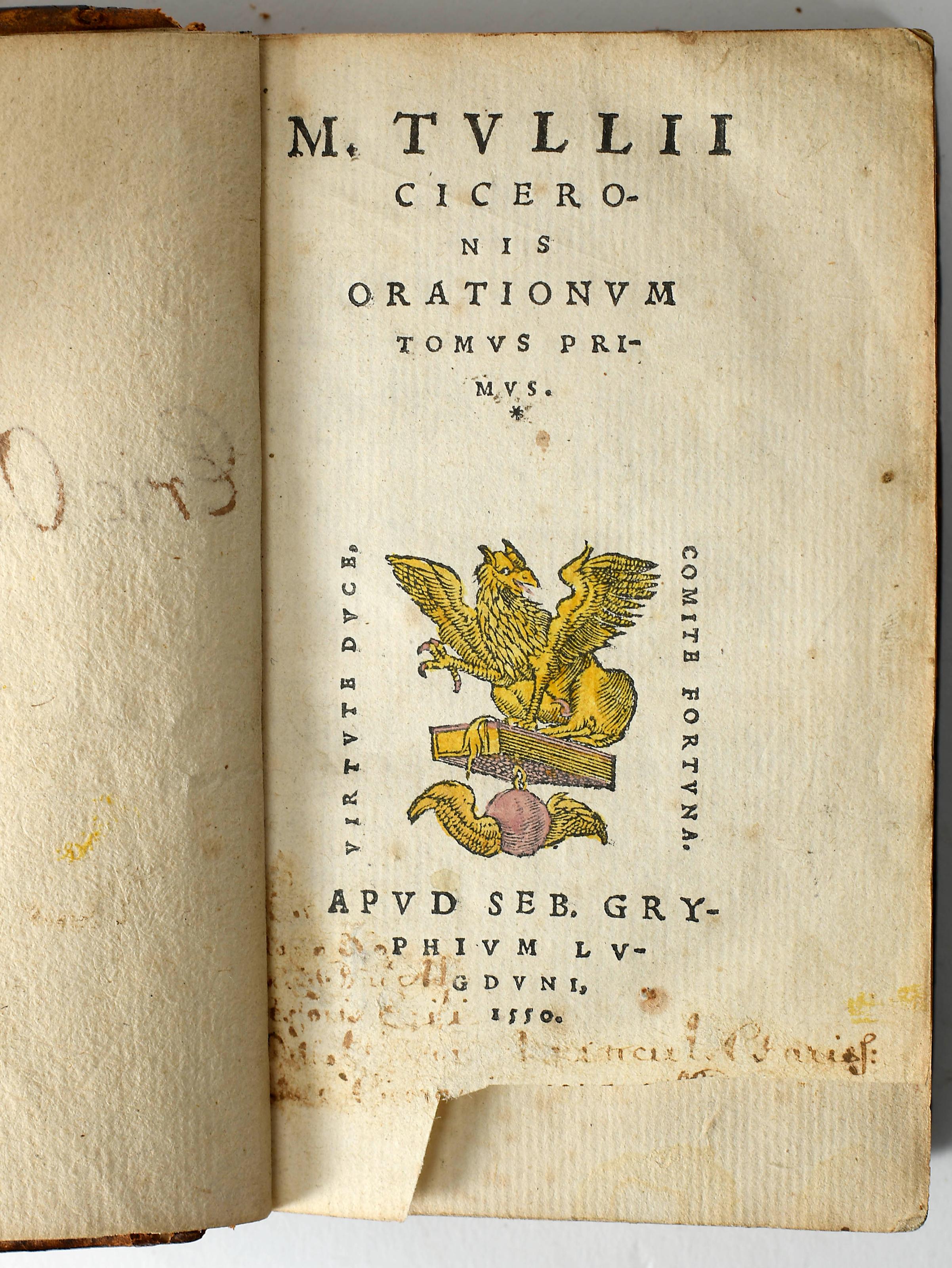CICERO, Marcus Tullius (106-43 B.C.). De natura deorum . - De divinatione . - De fato . - De legibus . - Academica . - Pomponius LAETUS. De re militari . [Venice]: Vindelinus de Spira, 1471. Royal 4° (276 x 195mm). Collation: [1 2 2 8(8+1) 3-8 8 9 6 10-14 8 15 6 16-22 8 23 8(+2 or 7) 24 8 25 4] (1/1r Life of Cicero excerpted from Petrarch, 2/2r hexameters 2/2v blank, 2/3r De natura deorum , 10/1r De divinatione , 16/1r De fato , De legibus , 20/7,8 blank, 21/1r Academica , De re militari , 25/3v verses by Raphael Zovenzonius praising the printer and P. Aluisius, 25/4 blank). 280 leaves (of 287, lacking first quire (supplied in pen-and-ink facsimile), 2/9, 4/1.8, and without blank 20/7,8), fos. 20/1 and 2 reversed in binding. 34 lines. Types: 1:110R, a few Greek words. 3- to 5-line initial spaces with guide-letters, remains of contemporary MS quiring, 2 pinholes still visible. (Marginal annotations washed, some spotting, small paper flaw in 2/6, small wormholes in final quires, one touching some letters.) 19th-century red morocco, wide gilt roll-tooled border (rebacked, front cover loose, corners worn), by Hodgson, Liverpool. Provenance : Earls of Derby (bookplate with crest). FIRST EDITION. Written toward the end of Cicero's life, De natura deorum sets forth in dialogue form the main tenets of three philosophical schools: the Stoic, Epicurean and the Academic. It is joined here by other philosophical writings on free will and the Stoic belief on fate and prediction, and the Athenian new Academy, and a political work, De legibus . Hitherto unnoted is that either 23/2 or 7 has been cancelled, but due to tight binding it has not been possible to distinguish between them in either the present copy or the British Library copies. As noted in BMC, the sequence of watermarks indicates that the four sections were printed off concurrently. HC *5334; BMC V, 158 (IB. 19528-9); GW 6902; Klebs 276.1; Goff C-569.
CICERO, Marcus Tullius (106-43 B.C.). De natura deorum . - De divinatione . - De fato . - De legibus . - Academica . - Pomponius LAETUS. De re militari . [Venice]: Vindelinus de Spira, 1471. Royal 4° (276 x 195mm). Collation: [1 2 2 8(8+1) 3-8 8 9 6 10-14 8 15 6 16-22 8 23 8(+2 or 7) 24 8 25 4] (1/1r Life of Cicero excerpted from Petrarch, 2/2r hexameters 2/2v blank, 2/3r De natura deorum , 10/1r De divinatione , 16/1r De fato , De legibus , 20/7,8 blank, 21/1r Academica , De re militari , 25/3v verses by Raphael Zovenzonius praising the printer and P. Aluisius, 25/4 blank). 280 leaves (of 287, lacking first quire (supplied in pen-and-ink facsimile), 2/9, 4/1.8, and without blank 20/7,8), fos. 20/1 and 2 reversed in binding. 34 lines. Types: 1:110R, a few Greek words. 3- to 5-line initial spaces with guide-letters, remains of contemporary MS quiring, 2 pinholes still visible. (Marginal annotations washed, some spotting, small paper flaw in 2/6, small wormholes in final quires, one touching some letters.) 19th-century red morocco, wide gilt roll-tooled border (rebacked, front cover loose, corners worn), by Hodgson, Liverpool. Provenance : Earls of Derby (bookplate with crest). FIRST EDITION. Written toward the end of Cicero's life, De natura deorum sets forth in dialogue form the main tenets of three philosophical schools: the Stoic, Epicurean and the Academic. It is joined here by other philosophical writings on free will and the Stoic belief on fate and prediction, and the Athenian new Academy, and a political work, De legibus . Hitherto unnoted is that either 23/2 or 7 has been cancelled, but due to tight binding it has not been possible to distinguish between them in either the present copy or the British Library copies. As noted in BMC, the sequence of watermarks indicates that the four sections were printed off concurrently. HC *5334; BMC V, 158 (IB. 19528-9); GW 6902; Klebs 276.1; Goff C-569.

.jpg)



.jpg)









Testen Sie LotSearch und seine Premium-Features 7 Tage - ohne Kosten!
Lassen Sie sich automatisch über neue Objekte in kommenden Auktionen benachrichtigen.
Suchauftrag anlegen